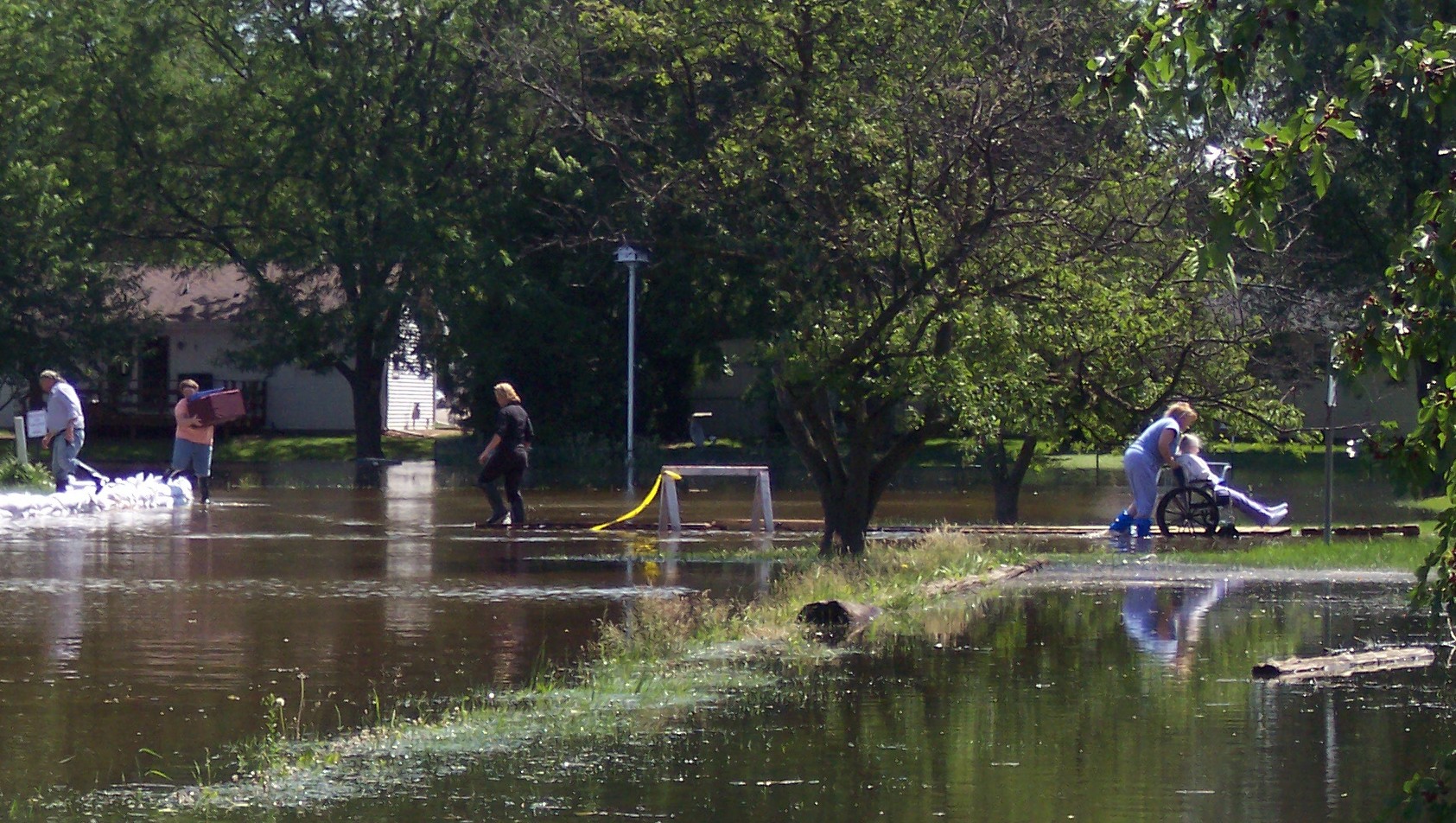Folks, I have a rare treat for you. Today I’d like to give the floor to freelance reporter Chris Welch, who has been covering the flooding in the state of Wisconsin. I had met Chris at a science fiction convention in Madison called OddCon where we were speaking on some of the same panels. Chris is the sort of guy that you’d like to hang around; he’s very personable and loves to write and speak about writing. In his first-ever blog post, Chris speaks from the heart, talking about what it’s like being a freelance reporter when a tragedy like the Wisconsin flooding occurs.
“They’re not talking about us.”
That statement, a frustration voiced by a Fort Atkinson resident about his flooded neighborhood, also provided a concise reason why writers like us write.
I’d like to thank Monica for the opportunity to guest-blog here. “Words on the Water” seems the most fitting place to blog on writing about floods and the stories surrounding those floods.
There’s a 30-county region of Wisconsin affected by various forms of saturation. But, as a freelance reporter for a small-town newspaper, I’m only concerned with one, Jefferson County. The newspaper covers three main cities here: Fort Atkinson, Jefferson and Whitewater (which is divided by Jefferson and Walworth Counties.)
 My usual beat is Whitewater, Wisconsin. It was spared major flooding, so my editors asked me to cover some flood-related stories, which affected the cities of Jefferson and Fort Atkinson most drastically.
My usual beat is Whitewater, Wisconsin. It was spared major flooding, so my editors asked me to cover some flood-related stories, which affected the cities of Jefferson and Fort Atkinson most drastically.
Except half the stories I covered this week were other stories — stories that the flood did not have any affect on at all. Despite evacuated homes and businesses, there were other things people wanted to talk about. I’ll get to those in a moment.
The floods had their own tales, which were stories for me to tell.
The Rock River surpassed its banks in Jefferson. The main east-west artery into the city was already closed for a re-surfacing project. The rising waters took out the detour routes one by one, like victims in an Agatha Christie novel. First the one bridge was closed, then a local burger place closed, then the meat-packaging plant, then the cat-food plant, then the other bridge closed.
This deluge headed south to Fort Atkinson, which was only made worse by the Crawfish and Bark Rivers (tributaries each already flooded) which converge into the Rock River in Fort. Homes and business along the shore, and others not along the shore but still too close were evacuated.
The editors call me. They are evacuating an elder care facility in Fort. Can I get there to cover it? Sure. I get there, camera in hand. I walk knee-deep into water to get decent shots. I snap the flooded entrance surrounded by defeated sandbags. I slosh around back and snap a nurse pushing a wheelchair-bound patient across a bridge of pallets and planks.
I speak with people. I get their story. I get this story. I go back to write it up.
Editors call again. The Secretary of Health is coming to Jefferson. Can I cover it? Sure. I take detours around the now-submerged original detours. I meet the Secretary. I get her story. I get this story. I write it up.
Another call. A Fort resident sent flood pictures to CNN. He’s going to be on live via phone in 30 minutes. Can I cover it? Sure. I go to his house. I watch him speak on live TV to a CNN anchor. When it’s over, I get his story. I ask why he sent the pictures.
“They’re not talking about us,” he said. “They talk about Iowa, Illinois and Missouri. They are not talking about us.”
And that is what we, as writers, do as our calling. We make the stories known. We make sure the stories are told. We find those stories in emergencies like evacuations, and in secondary detours, and in flooded burger joints. Writers communicate stories, even the stories that are not ours: “They’re not talking about us.”
We talk about them in fiction, poetry, plays, and newspapers.
Those other stories I mentioned? As Jefferson and Fort sank this week, other people wanted to be “talked” about: As the National Guard arrived in Jefferson, I covered the Rotary Club Annual Award Luncheon. As FEMA toured damaged areas, I covered a local elected official’s press conference to announce he was not running for re-election.
The Red Cross set up shop as a local business held a ribbon cutting for its new expansion. Furthermore, 70 evacuated patients made home in a church hall, as the city council authorized a land annexation at its meeting that night.
Those stories give us something to talk about as well.
_________________________________________________________________
Chris Welch is a happily-married freelance reporter, writer and reviewer. He mostly works for the Daily Jefferson County Union newspaper and WFAW 940 AM radio in Fort Atkinson, Wisconsin. His most recent creative works will be appearing in the upcoming anthologies “The HWA Presents: Blood Lite” and “Catapolis.”



Comments are closed.